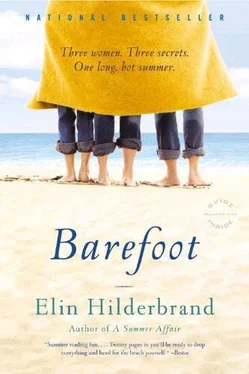Elin Hilderbrand - Barefoot - A Novel
Здесь есть возможность читать онлайн «Elin Hilderbrand - Barefoot - A Novel» весь текст электронной книги совершенно бесплатно (целиком полную версию без сокращений). В некоторых случаях можно слушать аудио, скачать через торрент в формате fb2 и присутствует краткое содержание. Жанр: Старинная литература, на английском языке. Описание произведения, (предисловие) а так же отзывы посетителей доступны на портале библиотеки ЛибКат.
- Название:Barefoot: A Novel
- Автор:
- Жанр:
- Год:неизвестен
- ISBN:нет данных
- Рейтинг книги:4 / 5. Голосов: 1
-
Избранное:Добавить в избранное
- Отзывы:
-
Ваша оценка:
- 80
- 1
- 2
- 3
- 4
- 5
Barefoot: A Novel: краткое содержание, описание и аннотация
Предлагаем к чтению аннотацию, описание, краткое содержание или предисловие (зависит от того, что написал сам автор книги «Barefoot: A Novel»). Если вы не нашли необходимую информацию о книге — напишите в комментариях, мы постараемся отыскать её.
Barefoot: A Novel — читать онлайн бесплатно полную книгу (весь текст) целиком
Ниже представлен текст книги, разбитый по страницам. Система сохранения места последней прочитанной страницы, позволяет с удобством читать онлайн бесплатно книгу «Barefoot: A Novel», без необходимости каждый раз заново искать на чём Вы остановились. Поставьте закладку, и сможете в любой момент перейти на страницу, на которой закончили чтение.
Интервал:
Закладка:
Vicki had held Ted hostage with her eyes. Since her diagnosis, she’d watched him constantly—tying his necktie, removing change from his suit pocket, stirring sugar into his coffee—hoping to memorize him, to take him with her wherever she went.
I’ll miss you, she said. But I’m going.
The cottage had been built in 1803—back, Vicki thought, when life was both busier and simpler, back when people were shorter and held lower expectations. The cottage had original y been one room with a fireplace built into the north wal , but over the years, three “warts” had been added for bedrooms. Al of the rooms were smal with low ceilings; it was like living in a dol house. That was what Aunt Liv had loved about the cottage—it was life pared down, scaled way back. There was no TV, no answering machine, no computer or microwave or stereo. It was a true summerhouse, Aunt Liv used to say, because it encouraged you to spend most of your time outside—on the back deck overlooking the yard and garden, or down the street at ’Sconset’s public beach. Back in 1803 when the woman of the house had cancer, there were no oncologists or treatment plans. A woman worked right through it—stoking the fire, preparing meals, stirring the laundry in a cauldron of boiling water—until one day she died in bed.
These were Vicki’s thoughts as she stepped inside.
The cottage had been cleaned and the furniture aired. Vicki had arranged for al of this by telephone; apparently, houses that sat dormant for three years were common stuff on Nantucket. The house smel ed okay, maybe a bit too optimistical y like air freshener. The living room floors were made from wide, buttery pine boards that showed every scratch from a dragged chair, every divot from a pair of high heels. The plaster-and-wood-beamed ceiling was low, and the furniture was old-ladyish, like something out of a Victorian bed-and-breakfast: Aunt Liv’s delft blue high-back sofa, the dainty coffee table with a silver-plated tea service resting on a piece of Belgian lace. There were the bookshelves bowing under the weight of Aunt Liv’s summer library, there was the fireplace with mismatched andirons. Vicki moved into the smal kitchen, appliances circa 1962, silver-threaded Formica, Aunt Liv’s china, which was painted with little Dutch girls in wooden shoes. The caretaker’s bil was secured to the refrigerator with a magnet advertising a restaurant cal ed the Elegant Dump, which had been defunct for years.
The west bedroom was sunny. That would be Melanie’s room. Twin beds were made up with the pink-and-orange-striped sheets that Vicki remembered from her childhood. (What she remembered most vividly was staining the sheets during her first period. Aunt Liv had sensibly pul ed out the hydrogen peroxide while El en Lyndon had chirped with over-the-top sentimentality about how “Vicki is a woman now” and Brenda glowered and chewed her cuticles.) Vicki would take the largest bedroom, with the king bed, where she would sleep with the kids, and Brenda would sleep in the old nursery, a room just slightly bigger than Vicki’s walk-in closet at home. This was the room Aunt Liv had always occupied—it was cal ed the old nursery because both Aunt Liv and Vicki and Brenda’s grandmother Joy had slept in cribs in that room alongside the family’s baby nurse, Miss George, more than eighty years earlier. Once Aunt Liv had arthritis and every other old-person ailment, Vicki’s parents suggested she take the big bedroom—but that didn’t suit Liv. She stopped coming to Nantucket altogether, and then she died.
There was a flurry of activity as everyone piled into the house, dragging luggage and boxes. The cabbie stood by the car, waiting to be paid. That was Vicki’s department. She was going to pay for everything al summer. She was summer’s sponsor. She handed the kid twenty bucks. Enough?
He grinned. Too much. “Thanks, ma’am. Enjoy your stay.”
As the cab pul ed away, Blaine started to cry. Vicki worried that al the change would traumatize him; there had been a scene at breakfast when he’d said good-bye to Ted, and then he’d knocked Melanie off the airplane’s steps. He was acting out. It was three o’clock, and although he was outgrowing his nap, Vicki knew he needed some quiet time. She herself was bone weary. Just picking up her bag and walking five feet to the bedroom made her feel like she’d climbed Mount Kilimanjaro. Her lungs were on fire. She hated them.
Suddenly, Brenda made a noise even worse than Blaine’s whiny cry. She was moaning in that Oh no, oh no, no, the-world-is-ending kind of way .
What was it? A dead animal in the old nursery? A family of dead animals? Vicki lowered her bottom onto her bed’s squishy mattress. She didn’t have the energy to move, so she cal ed out, “What’s wrong, Bren?”
Brenda appeared in the absurdly low doorway of Vicki’s bedroom. “I can’t find my book.”
Vicki didn’t have to ask which book. This was Brenda, her sister. There was only one book: Brenda’s two-hundred-year-old first edition of Fleming Trainor’s The Innocent Impostor . This book, a little-known novel of a mediocre Early American writer, was the foundation of Brenda’s career. Brenda had spent six years getting her master’s degree and doctorate from the University of Iowa, she had written a dissertation and had part of it published in an obscure literary journal, and she’d landed the job at Champion University—al because of this book. The first edition was an antique, worth thousands of dol ars, Brenda claimed. She had owned it since she was fourteen years old, when she bought it for fifty cents at a flea market. The book was, for al intents and purposes, Brenda’s pet. She wouldn’t consider leaving it in Manhattan, where the subletter could get at it. It had traveled with them in a special briefcase—temperature and humidity control ed, the whole nine yards. Now it was missing.
“Are you sure?” Vicki said. “Did you check everywhere?” Despite the fact that Brenda’s missing book fel squarely onto Vicki’s List of Things That No Longer Matter, she tried to summon sympathy in the interest of getting things off to a good start. And crises of this nature were Vicki’s specialty. With the kids, her day was spent hunting for things: the other shoe, the bal that rol ed under the sofa, the pacifier!
“Everywhere,” Brenda said. It was amazing how quickly her demeanor had changed. She had been a bitch al day, but now that her book was missing, she was turning into the cake that someone left out in the rain. Her cheeks were blotching, her hands were twitching, and Vicki sensed tears weren’t far off.
“What if I lost the book?” Brenda said. “What if I left it at”—the next word was so awful, it stuck like a chunk of carrot in the back of her throat
—“LaGuardia?”
Vicki shut her eyes. She was so tired she could sleep like this, sitting up. “You carried it off the plane with you, remember? You had your little purse, and . . .”
“The briefcase,” Brenda said. She blinked rapidly, trying to fend off the tears. Vicki felt a surge of anger. If Brenda had been the one to get cancer, she wouldn’t have been able to deal. God never gives you more than you can handle—this saying was repeated with conviction at Vicki’s cancer support group—and that is why God did not give Brenda cancer.
Somewhere in the house, the baby was crying. A second later, Melanie appeared. “I think he’s hungry,” she said. She caught a whiff of Brenda’s desperate mien—the hands were stil twitching—and she said, “Honey, what’s wrong? What’s wrong? ”
“Brenda lost her book,” Vicki said, trying to sound grave. “Her old book. The antique.”
Читать дальшеИнтервал:
Закладка:
Похожие книги на «Barefoot: A Novel»
Представляем Вашему вниманию похожие книги на «Barefoot: A Novel» списком для выбора. Мы отобрали схожую по названию и смыслу литературу в надежде предоставить читателям больше вариантов отыскать новые, интересные, ещё непрочитанные произведения.
Обсуждение, отзывы о книге «Barefoot: A Novel» и просто собственные мнения читателей. Оставьте ваши комментарии, напишите, что Вы думаете о произведении, его смысле или главных героях. Укажите что конкретно понравилось, а что нет, и почему Вы так считаете.












